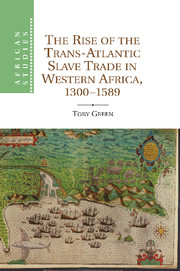Book contents
- Frontmatter
- Contents
- List of Maps
- Acknowledgements
- Abbreviations
- Glossary
- Introduction Rethinking the Trans-Atlantic Slave Trade from a Cultural Perspective
- Part One The Development Of An Atlantic Creole Culture In Western Africa, Circa 1300–1550
- 1 Culture, Trade and Diaspora in Pre-Atlantic Western Africa
- 2 The Formation of Early Atlantic Societies in Senegambia and Upper Guinea
- 3 The Settlement of Cabo Verde and Early Signs of Creolisation in Western Africa
- 4 The New Christian Diaspora in Cabo Verde and the Rise of a Creole Culture in Western Africa
- 5 The New Christian/Kassanké Alliance and the Consolidation of Creolisation
- Part Two Creolisation And Slavery
- Bibliography
- Index
4 - The New Christian Diaspora in Cabo Verde and the Rise of a Creole Culture in Western Africa
from Part One - The Development Of An Atlantic Creole Culture In Western Africa, Circa 1300–1550
Published online by Cambridge University Press: 05 November 2011
- Frontmatter
- Contents
- List of Maps
- Acknowledgements
- Abbreviations
- Glossary
- Introduction Rethinking the Trans-Atlantic Slave Trade from a Cultural Perspective
- Part One The Development Of An Atlantic Creole Culture In Western Africa, Circa 1300–1550
- 1 Culture, Trade and Diaspora in Pre-Atlantic Western Africa
- 2 The Formation of Early Atlantic Societies in Senegambia and Upper Guinea
- 3 The Settlement of Cabo Verde and Early Signs of Creolisation in Western Africa
- 4 The New Christian Diaspora in Cabo Verde and the Rise of a Creole Culture in Western Africa
- 5 The New Christian/Kassanké Alliance and the Consolidation of Creolisation
- Part Two Creolisation And Slavery
- Bibliography
- Index
Summary
The last forty years have seen a significant body of work done on the New Christian diaspora in the Iberian Atlantic world. It has become clear that the New Christians were perhaps the key mercantile community linking the trading economies of Africa, America and Europe in the early Atlantic era to circa 1640. Their networks in the Low Countries helped to integrate the trade of Atlantic sugar for Northern European textiles and Baltic wheat exchanged between Iberia and Flanders. The early establishment of a community in Antwerp and the opening of a Sephardic Jewish community in Amsterdam in 1596 opened the way for Dutch trade and influence in the Caribbean and Brazil. The links with New Christian families in Portugal and Spain encouraged the spread of New Christian communities throughout the New World. Scholars still dispute the place of this diaspora in the overall emergence of Atlantic trade, but there is no question that it was significant. In this work, the picture of the New Christian diaspora in West Africa has only recently come to the fore. Yet as we shall see in this chapter and the next, this diaspora was extremely important in the early period in Western Africa, at the very same time as the first signs of an Atlantic Creole community were emerging there.
Caboverdeans themselves are well aware of this strand of their early history. A second wave of Sephardic migration from Morocco in the nineteenth century has contributed to a sense of the significance of this first wave for the islands’ cultural identity. A researcher looking for residues of this often finds gratifying results. During a chance discussion in 2003 at a bar in Praia, the national capital, all three of my interlocutors claimed Jewish ancestry, and one of them had the surname Ben-Simon; at another bar, the landlady said her surname was Levi; and as I was shown by Januário Nascimento, then president of the Caboverdean-Israel Friendship Society, headstones with Hebrew inscriptions can be found in the main cemetery at Praia and in the highlands of Santiago island in the back yards of small farmsteads.
- Type
- Chapter
- Information
- Publisher: Cambridge University PressPrint publication year: 2011



